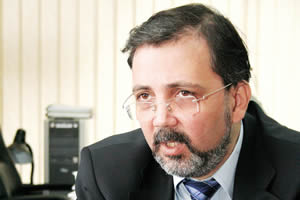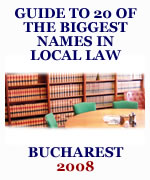Public admin remains
at crisis point
Inefficiency in public service is holding Romania’s development back, argues Adrian Ciocanea, head of the Department for European Affairs
 |
|
|||||||||||||
A massive impediment to Romania’s
development as an EU
member state is the lack of
efficiency in central and local administration.
Human resources are a major problem
as staff turnover is volatile, people
change positions regularly and ineptitude
is prevalent.
“Usually people want to work in the
administration because they believe this
is an opportunity to reach higher positions,
while others are simply not competent
enough to get hired somewhere else,”
secretary of state and head of the Department
for European Affairs (DAE) Adrian
Ciocanea tells The Diplomat.
Public servants are appointed to high
positions and asked to solve problems
that have remained unresolved by their
predecessors for many years. Salaries are
low and staff leave to the private sector.
Also it is diffi cult to sack a useless
person in the civil service. “A director
in a Ministry needs two years of annual
unsatisfactory evaluations in a row to be
thrown out,” Ciocanea says. Some key
decision-makers believe that the positions
they hold are for life and act as though
they are untouchable.
However the secretary of state fears
that instead of implementing a plan to
reduce the headcount of public servants
to make them more accountable and efficient, the country may see an increase in
people hired in local dministration. This
is due to the autonomy that county councils
and mayors now enjoy.
“Any mayor or county council can
hire as many people as they want because
the state and the contributors pay and no
one else regulates this,” he says. Councils
could boost their employees for political
gain, with effi ciency losing out.
There is some hope. The Government,
political parties, unions and NGOs have
agreed to draw up a plan of reforms for
2008 based on the principles of the EU’sLisbon Strategy, which aims to increase
economic competitiveness. This month
the document is put under public debate
and the Government will adopt Romania’s
strategy for 2008. Ciocanea, its coordinator,
says Romania should be proud as the
fi rst country to take such action, especially
considering that it was only last March that
the EU decided to relaunch the document.
The development of entrepreneurship
and small and medium-sized enterprises
(SMEs), the increase of renewable energy
sources and a higher compatibility between
the demands on the workforce and
the qualifi cation of young graduates are
the plan’s main objectives. Part of this is
the necessity to reduce high bureaucracy
in Romania, which are huge burdens for
small entrepreneurs and obstacles for a
foreign investor. “We want to eliminate 25
per cent of the authorisations needed for a
company to set up,” Ciocanea says.
Another decision is to increase SMEs’
access to auctions for public works. For
example, a small construction company
has to employ a topographer to be allowed
to apply for a tender to paint schools in a
village. The Government will eliminate
similarly odd conditions.
But these reforms do not answer the
demands of many businesses and foreign
investors for easing the restrictions on hiring
workers from non-EU countries.
Industries such as shipbuilding in Romania
registered losses of 45 million Euro
in 2007, because thousands of people left to
work in other countries for higher salaries.
There are too few skilled Romanians to fill
the positions and this sector needs to import
workers from China, Vietnam or Ukraine.
But Romanian legislation makes it difficult
for a company to bring non-EU workers,
who have to wait months, and sometimes
years, to receive a work permit.
Each member state can negotiate with
Brussels the number of non-EU workers it
needs. These take place after the business
community in a certain country voices its
needs to the Government. In Romania, the
Ministry of Labour is responsible for this.
But despite massive pressure from business
over the last two years, it has not appealed
to Brussels to loosen the restrictions.
Post EU-accession strategy:
dead and buried
The secretary of state has also been responsible
for drawing up a National Post-
EU Accession Strategy. This is the sevenyear
plan that every new EU nation needs
to outline which direction the country is
heading and how to exploit the opportunities
of member status. The strategy should
include political and economic goals which
can help attract foreign investments.
Ciocanea and many experts compiled
the document. But this was in vain
as there was no cross-party consensus to
agree a fi nal draft. It was buried. After 18
months in the EU, Romania remains without
a post-accession strategy.
Interview by Ana Maria Nitoi

















